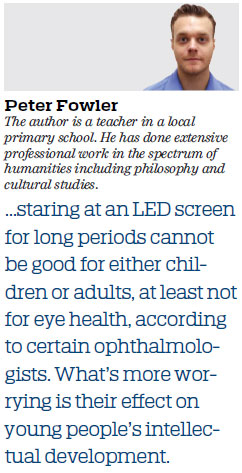Alarming number of children consumed by digital addiction
Updated: 2019-01-28 07:14
By Peter Fowler(HK Edition)
|
|||||||||
The findings of a recent Chinese University of Hong Kong study that Hong Kong's youngsters are now more glued to the screens of their digital devices than two years ago and that their physical fitness is alarmingly low have surprised few. Most of us must have witnessed the obsessive smartphone usage and its addiction around us, particularly among young people, and probably wondered about its effects on the user. We see it every day particularly on the streets and in fast food shops, the MTR and on board buses. Countless people have walked into me with necks bent, heads down low and eyes glued to LED screens whilst thumbs vigorously type and swipe through various applications and games. And I'm sure many of us have witnessed the viral videos of pedestrians walking straight into large objects such as lampposts and fountains, whilst distracted only by their handheld devices. It goes without saying that many adults are equally guilty of this intoxicating habit. What's particularly alarming though is the overwhelming number of children that indulge in such questionable online social media and trivial electronic games and its as yet unknown long-term effects.
Many young children either possess their own smartphones and tablets, or have easy access to one on an extremely frequent basis. Nowadays, parents typically use these technologies to silence screaming babies and toddlers on public spaces, transport or big gatherings. I recall a time I was at a wedding and during the service, a four-year-old boy was given an iPad to keep him entertained to prevent him from interrupting the one-hour ceremony, because making him sit quietly without such a device was seemingly out of the question. Gone are the days of children learning to sit unoccupied through celebratory ceremonies!
Only time will tell on the long-term consequence of obsessive smartphone usage, but staring at an LED screen for long periods cannot be good for either children or adults, at least not for eye health, according to certain ophthalmologists. What's more worrying is their effect on young people's intellectual development. Already, I can see a deterioration of my students' verbal communication skills, no doubt due to lack of practice.

Young people's obsession with their smartphones clearly makes them oblivious at times to their immediate environment, or becoming self-centered. Having worked as a teacher in a language center, I've witnessed in astonishment many students think nothing other than using their smartphones while a lesson was in progress. When I tried to put a stop to this, some parents even complained about the harshness of my methods! A former student proceeded to ignore me when I instructed him to put away his phone, so another student intervened by casually switching off his game. The recalcitrant student then angrily lashed out at the other boy in exasperation and then sobbed for the next five minutes. This boy's parents couldn't understand why their son's grades were steadily deteriorating and refused to acknowledge that it was the result of uncapped playtime on his smartphone. They insisted that he needed a phone so that he could contact his domestic helper or parents in times of need. This was understandable, but did he really need the latest Samsung smartphone for such purpose? And surely the student can put away his smartphone while the class is in session.
I have also recommended a phone with basic calling and texting functions for school students without other distractions. Worryingly, a large number of children are also joining social media apps intended for adults, such as Facebook and Instagram. These apps have the capability of linking students up to anyone in the world at a click of a button - or rather, a tap on the screen. Linking children to the oftentimes nefarious world of social media carries with it great risks of potential harm if they were to engage with the wrong people.
Another factor making children become so obsessed with smartphones is their lack of direct interpersonal communication. Unless a child or a teenager is at school where mobile phones are prohibited, they don't appear to communicate as much with family and friends as earlier generations of youngster did. Nowadays, many just sit silently engrossed in their devices constantly updating themselves mindlessly on the latest trends of games or social media, the only sounds they make are the agitated cries of frustration when they are losing a game! A local taxi driver once told me that a group of teenage passengers he had picked up sat in total silence throughout the entire journey, only to realize that they were in fact communicating with one another over their phones without verbalizing a single word. It is as if we are raising a generation of androids almost incapable of experiencing life beyond a screen.
I'm not dismissing the otherwise useful functions of smartphones that make our lives easier. But to spend a big part of your waking hours in trivial pursuits available from these machines at the expense of direct enriching interpersonal exchanges is detrimental to young people's intellectual and character development. We adults need to start offering guidance on their use and set good examples ourselves.
(HK Edition 01/28/2019 page8)